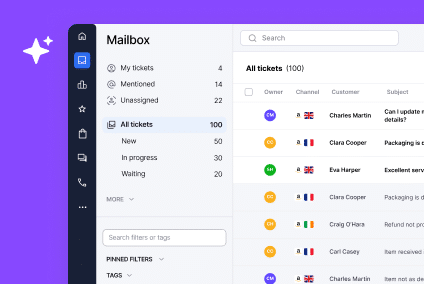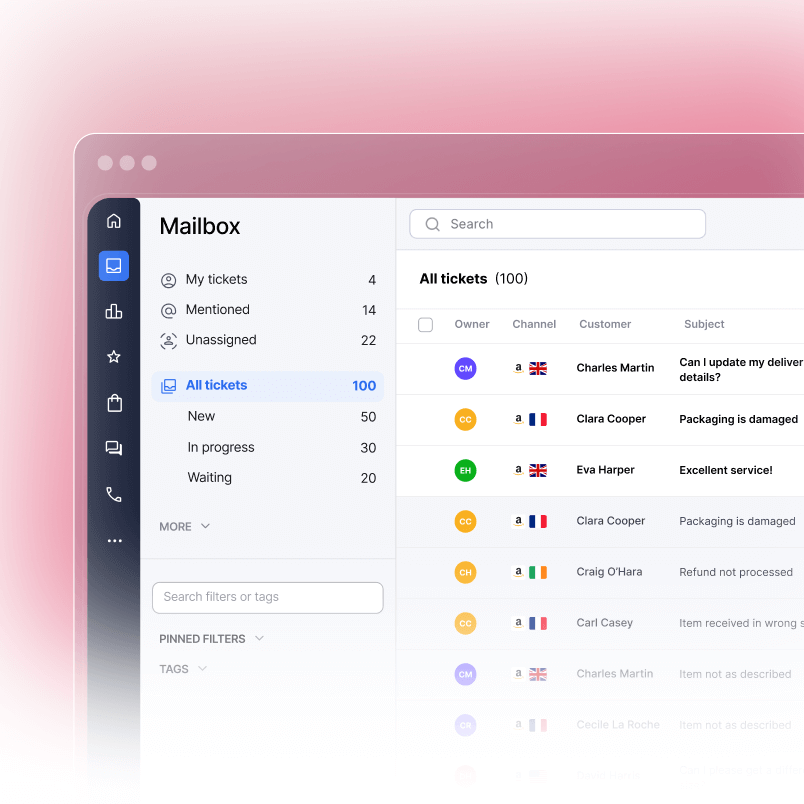Great eCommerce support goes far beyond sending fast replies. It’s about people connecting with people, solving real problems, and turning frustrated customers into loyal advocates. When you’re selling online, your support team is often your only human touchpoint with customers. What they do in those conversations shapes whether someone returns to buy again or leaves a negative review.
This guide walks through 20 essential customer service skills every eCommerce support team needs, from soft skills like empathy to hard skills like product knowledge and CRM proficiency. You’ll learn why each skill matters, how to train it, and which tools support skill development. The goal is clear: boost CSAT scores, reduce escalations, and build customer loyalty that sticks.
Contents
What Makes Customer Service Skills Critical in eCommerce The Top 20 Customer Service Skills Every Team Needs How to Train and Assess These Skills Tools That Reinforce Skill Development Getting Started With Your Support Team
What Makes Customer Service Skills Critical in eCommerce
eCommerce customer service runs at a different pace and pressure than traditional retail. Customers expect replies within hours, not days. They’re often upset about orders, shipping delays, or product quality. And unlike in-store interactions, your team can’t use body language, tone of voice, or a friendly smile to smooth things over.
This is why skills matter so much. When customers can’t see your face or hear your voice, your words carry more weight. A single poorly written email can feel cold or dismissive. A thoughtful response that acknowledges their frustration can flip a negative situation. Speed matters too, but not at the cost of quality. Customers would rather wait a few hours for a helpful response than get a quick brush-off.
The data backs this up. According to recent research, customer satisfaction with support quality ranks higher than price when deciding where to shop. Poor support drives refund requests and negative reviews. Strong support builds repeat purchases and organic word-of-mouth referrals. Your team’s skills directly affect your bottom line.
The Top 20 Customer Service Skills Every Team Needs
1. Empathy
Why It Matters: Empathy is the foundation of good customer service. It means understanding what a customer feels, not just what they’re saying. A customer complaining about a delayed order isn’t really upset about time; they’re worried about missing an event or disappointed about broken expectations. Research shows that customers who feel understood are significantly more likely to become repeat buyers. Empathy lets your team see the emotion behind the complaint.
How to Train It: Role-play frustrating scenarios with your team. Have them imagine themselves in the customer’s shoes. Ask questions in team meetings: “How would you feel if this happened to you?” Encourage note-taking on customer emotions, not just facts. Pair new hires with empathetic team members for shadowing sessions.
2. Active Listening
Why It Matters: Active listening means fully absorbing what a customer says before jumping to solutions. Many support tickets fail because agents didn’t catch the real issue on the first read. A customer might mention a color preference in passing, but that detail matters for the right solution.
How to Train It: Use listening checklists during QA reviews. Have agents repeat back what they heard to confirm understanding. Record and play back sample calls or chat transcripts. Ask agents to summarize the customer’s issue in their own words before responding.
3. Product Knowledge
Why It Matters: Agents with deep product knowledge answer questions faster and spot upsell opportunities. They know which products pair well together, which sizes run small, and which features solve specific problems. This confidence builds customer trust.
How to Train It: Create a searchable product wiki with photos, specs, and common questions. Have agents use your products themselves. Run weekly product training sessions. Use tools like a knowledge base that agents can quickly reference during chats or emails.
4. Problem-Solving
Why It Matters: Not every customer issue has a one-step fix. Some require creative thinking, policy bending, or cross-department coordination. Problem-solving skill separates okay support from great support.
How to Train It: Present complex scenarios during training. Ask “what if” questions. Encourage agents to brainstorm solutions with peers before escalating. Track which agents solve issues on first contact and ask them to mentor others.
5. Conflict Resolution
Why It Matters: Angry customers need skilled handling. Conflict resolution means de-escalating tension, finding common ground, and reaching resolution without making things worse. A mishandled angry customer becomes a public detractor on social media.
How to Train It: Run role-plays with increasingly difficult scenarios. Teach agents how to acknowledge frustration without admitting fault. Practice phrases like “I understand this is frustrating” and “Let me see what I can do.” Review recordings of tough interactions to spot improvement areas.
6. Clear Written Communication
Why It Matters: Most eCommerce support happens via email or chat. If your writing is unclear, customers get confused, request clarification, and your ticket volume balloons. Clear writing also sounds more professional and confident.
How to Train It: Create email templates with strong openers and clear structure. Test readability using tools that grade clarity. Have agents write sample responses and exchange them for peer feedback. Use templates for common issues to ensure consistency.
7. Patience
Why It Matters: Patience keeps interactions calm and productive. A frustrated agent rushes through explanations or comes across as annoyed. Patients agent stays engaged even with the fifth customer asking the same return question.
How to Train It: Monitor tone in chats and emails during QA. Watch for signs of impatience and coach agents privately. Share that breaks matter and encourage team members to take them. Build in buffer time between high-stress tickets so agents can reset.
8. Speed Without Sloppiness
Why It Matters: eCommerce customers expect fast replies. But fast replies with typos, wrong information, or incomplete answers create more work. Speed and accuracy must balance.
How to Train It: Measure first response time and resolution time. Celebrate quick turnarounds that maintain quality. Use auto-responses to set expectations: “We’ll reply within 2 hours.” Spot-check responses for accuracy before sending when possible using pre-send workflows.
9. CRM and Helpdesk Proficiency
Why It Matters: Your team spends hours in your customer support software daily. Agents who know shortcuts, automation, and features move faster and make fewer errors. They know where to find customer history and how to flag follow-ups.
How to Train It: Set up a sandbox environment where new hires practice before touching real tickets. Create shortcut guides for common tasks. Run monthly training on new features. Measure time-to-resolution for agents and correlate it with tool proficiency.
10. Attention to Detail
Why It Matters: Small mistakes compound. Wrong shipping address, misspelled name, or forgotten attachment frustrates customers and wastes time. Attention to detail prevents rework and shows respect for the customer.
How to Train It: Create QA checklists that flag common errors: is the ticket resolved, are all questions answered, is contact info correct? Have agents use checklists for outbound messages. Build in review steps for high-stakes replies.
11. Multichannel Support Handling
Why It Matters: Customers reach out via email, chat, WhatsApp, Facebook, and more. Agents need to adapt their tone and approach for each channel while keeping the message consistent. A customer who starts on chat and follows up on email should have a seamless experience. Studies show that 70% of customers expect businesses to handle inquiries across multiple channels seamlessly.
How to Train It: Use a unified inbox tool that brings all channels into one place. Train agents on the norms of each platform. Email is more formal; chat is more casual. Show how the same issue looks different across channels and how to respond appropriately.
12. Order Management Knowledge
Why It Matters: Most eCommerce support revolves around orders. Agents need to understand order status workflows, inventory, fulfillment, and tracking. This knowledge speeds up responses and reduces wrong information.
How to Train It: Map the complete order journey from checkout to delivery. Have agents walk through it themselves. Create a guide on what each order status means. Train them on how to read tracking data and explain delays to customers.
13. Returns and Refund Policies Familiarity
Why It Matters: Return and refund questions are high-volume and high-stakes. Customers are already unhappy; a confused response makes it worse. Agents who know your policy inside out can give quick, confident answers.
How to Train It: Make your return policy a required read during onboarding. Create a quick-reference guide with decision trees for gray-area situations. Role-play tough return scenarios. Have management clarify edge cases so agents know when to escalate.
14. Escalation Management
Why It Matters: Not every issue is for support to handle. Knowing what to escalate, to whom, and how keeps tickets moving and prevents bottlenecks. Poor escalation drowns managers in tickets that support could have solved.
How to Train It: Create an escalation matrix that shows which issues go to which team. Train agents on the difference between “escalate for decision” and “escalate for resources.” Review escalations in team meetings to identify patterns and retrain if needed.
15. Time Management
Why It Matters: Support teams juggle multiple channels and competing priorities. Agents who manage time well stay on top of urgent tickets, don’t let chats pile up, and meet SLA targets.
How to Train It: Introduce time-blocking techniques. Show agents how to batch similar tasks. Use your CRM to flag urgent tickets. Celebrate agents who hit response time targets consistently. Learn how to free up agent time with customer service automation so your team focuses on high-value interactions instead of repetitive tasks.
16. Tech Literacy
Why It Matters: Support agents need to troubleshoot basic tech issues, understand how to use browser tools, and gather screenshots or logs from customers. Tech literacy speeds up diagnosis and resolution.
How to Train It: Teach agents how to use screenshot tools, access browser console logs, and navigate your tech stack. Create guides for the most common tech questions. Pair less tech-savvy agents with stronger ones for specific training.
17. Positive Language Usage
Why It Matters: How you say something changes how customers feel. “I can’t process that” sounds unhelpful. “Here’s what I can do instead” sounds solutions-focused. Positive language builds confidence and reduces defensive reactions.
How to Train It: Create a “do and don’t” guide for common phrases. Replace “no” with “yes, and here’s the alternative.” Review agent responses during QA and highlight language choices. Make it a team conversation about tone.
18. Handling Angry Customers
Why It Matters: Angry customers test everything: patience, empathy, listening, problem-solving. How your team handles rage determines if they keep the customer or lose them permanently.
How to Train It: Run dedicated training on de-escalation. Teach the acronym LEAP: Listen, Empathize, Apologize (for impact, not fault), Problem-solve. Practice with recordings of tough interactions. Create a playbook for the most common complaint types. Our 10-step guide on turning angry customers happy provides real examples and tactical approaches your team can practice immediately.
19. Cultural Awareness
Why It Matters: If you ship internationally or serve diverse customer bases, cultural awareness matters. What feels friendly in one culture might feel too informal in another. What works in one country might offend in another.
How to Train It: Share insights about key markets you serve. Discuss communication norms, holidays, and taboo topics. Encourage agents to research customers’ locations before responding if relevant. If you have multilingual support, pair agents with native speakers for feedback on tone and appropriateness.
20. Upselling and Loyalty Reinforcement
Why It Matters: Support is a sales opportunity. A customer contacting you about a product is already engaged. Smart agents can recommend complementary products, highlight upgrades, or encourage repeat purchases without feeling pushy.
How to Train It: Share your best-sellers and product bundles with the team. Teach agents to listen for upsell opportunities without forcing them. Train them on the difference between helpful suggestion and sales pressure. Celebrate agents who successfully upsell without losing customer trust.
How to Train and Assess These Skills
Building a skilled support team isn’t one-time training. It’s ongoing coaching, feedback, and refinement. Research indicates that first contact resolution rates directly impact customer lifetime value, making skill development a financial priority. Here’s how to structure a training program.
Role-Play Scenarios
Start with scenarios that mirror real situations your team faces. Angry customer, confused about tracking, wants a refund. Lost package, needs expedited replacement. Use these scenarios in onboarding and monthly team training. Have agents practice and get real-time feedback from managers or experienced peers.
QA Scorecards and Coaching
Create QA scorecards that measure the skills you value. Include checkboxes for empathy shown, all questions answered, proper tone, and policy accuracy. Review 10-15% of tickets weekly per agent. Share feedback in one-on-ones, not in group settings. Celebrate improvements. The eCommerce customer support scorecard template helps you track agent performance across key metrics and identify skill gaps systematically.
Templates and Macro Writing Tests
Build templates and macros for common responses. This ensures consistency and speeds up work. Test agents’ ability to customize templates without sounding robotic. A good response uses the template as a foundation but personalizes details and tone.
Peer Feedback and Shadowing
Pair new hires with strong performers. Have them shadow interactions, take notes, and ask questions. Create peer feedback sessions where agents review each other’s tickets (anonymously) and suggest improvements. This builds camaraderie and lets strong performers teach without feeling like management is hovering.
Use eDesk’s eCommerce Support Scorecard
If you’re using eDesk, leverage the eCommerce customer support scorecard to track agent performance against key customer service metrics. This gives you baseline data on where coaching is needed and where to celebrate wins.
Tools That Reinforce Skill Development
The right tools make skill training stick and reduce errors.
Unified Inbox Platforms
A tool that brings emails, chats, social messages, and marketplace messages into one place helps agents master multichannel support. They see all customer history in context and respond from a single dashboard. This reduces mistakes and improves speed.
QA and Coaching Software
Tools like Klaus or Tethr record interactions, score them against rubrics, and flag coaching opportunities. Managers spend less time manually reviewing tickets and more time coaching based on data. Agents see clear feedback tied to skill gaps.
AI-Powered Reply Suggestions
AI tools can suggest responses, check tone, and spot missing information before an agent sends a reply. This supplements training and catches mistakes in real time.
Knowledge Management Systems
A searchable wiki or help center where agents find product info, policy details, and FAQs instantly. This reduces time spent hunting for answers and ensures consistent information.
Integrated CRM with Automation
Your main helpdesk tool should let agents see order status, customer history, and account info without leaving to check another system. Automation handles simple questions, freeing agents to focus on complex interactions.
Getting Started With Your Support Team
Building a strong support team takes commitment, but the payoff is real. Better support reduces refund requests, improves reviews, and drives repeat customers.
Start by auditing your team’s current skills. Which areas are strong? Which need work? Pick 2-3 skills to focus on this quarter, not all 20. Run role-plays, create templates, and measure results. Track metrics like CSAT, first response time, and resolution rate before and after training.
Invest in tools that support your training goals. A unified inbox prevents multichannel chaos. QA software makes coaching efficient and data-driven. Make skill development a regular part of your culture, not a one-time event.
Remember that great support agents are grown, not hired. They start with basic training and improve through feedback, practice, and mentorship. Celebrate improvement alongside wins. Your team will feel valued, stay longer, and deliver better service.
Ready to build a support system that scales? Try eDesk for free today. Our platform gives your team the tools to master these skills, from a unified inbox that handles every channel to QA workflows that make coaching simple. Start your free trial and see how better tools create better support.
FAQs
What are the most important customer service skills in eCommerce?
The most critical skills are empathy, active listening, product knowledge, clear communication, and the ability to handle conflict. These foundations matter in every interaction and directly impact customer satisfaction and loyalty. Speed matters too, but not at the cost of accuracy or kindness.
How do I train my eCommerce support team to improve these skills?
Use a mix of role-play scenarios, real ticket review through QA scorecards, peer shadowing, and one-on-one coaching. Make training ongoing, not a one-time event. Celebrate improvements and tie training to your business outcomes like CSAT and repeat purchase rates.
What tools help develop support agent skills?
Unified inbox platforms help agents manage multiple channels smoothly. QA and coaching software like Klaus gives managers data-driven feedback. Knowledge bases let agents find answers fast. Your helpdesk tool itself should support these goals through automation, templates, and integration with your order management system.
How do I know if my team has strong customer service skills?
Track metrics like CSAT score, net promoter score, first response time, resolution time on first contact, and refund rate. Conduct regular QA reviews using scorecards. Compare performance month over month. Ask for customer feedback directly. Strong teams show improvement in these metrics and handle tough situations calmly.
Can I automate parts of skill development?
Partially. AI can suggest responses and catch typos, speeding up work and reducing errors. Automation can handle simple, repetitive questions, freeing agents to tackle complex issues where human skill shines. But real skill development requires hands-on coaching, practice, and feedback from managers and peers. Automation supports training but doesn’t replace it.
How long does it take to build a skilled support team?
Foundation skills take 2-4 weeks of training. Mastery takes 3-6 months of consistent practice, feedback, and refinement. Some skills, like cultural awareness or handling angry customers, take longer because they require judgment and emotional intelligence. Invest in patience and long-term growth.
What should I do if an agent struggles with a specific skill?
Start with one-on-one coaching tailored to their challenge. Pair them with a strong peer for shadowing. Create a focused practice plan. Track small improvements weekly. Some skills come naturally; others take time. Support struggling agents instead of giving up on them.




